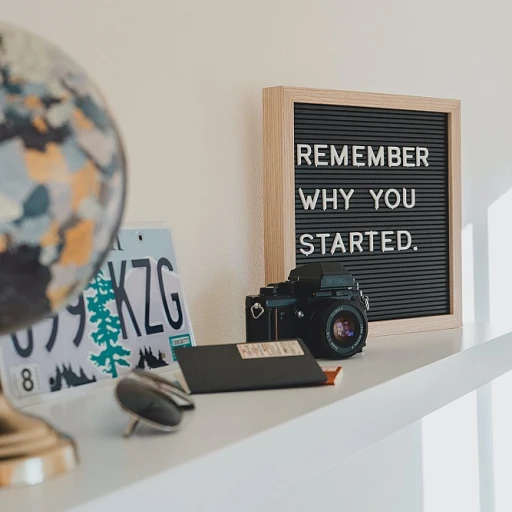Understanding the Role of Objections in Interviews
Recognizing the Significance of Objections in Interviews
In the context of job interviews, objections are an intrinsic part of the dialogue between the interviewer and the interviewee. Understanding these objections is crucial for candidates aiming to enhance their chances of success. Whether in a job interview or a sales call, objections indicate the prospect's or interviewer's hesitation or concerns that need addressing.
In the sales process, these can be seen as potential roadblocks that might prevent a customer from moving forward with a product or service. Similarly, in a job interview, objections can highlight areas where a candidate’s fit with the company may be in question. Acknowledging these instances doesn’t just showcase your active listening skills but also allows you to strategically overcome objections by addressing concerns head-on, which is a vital aspect of both business development and personal growth.
Common objections in interviews often revolve around the themes of experience, skills, and cultural fit. An interviewer might question your lack of experience with a specific product or why you left a previous position. These concerns must be handled deftly to keep the momentum of the interview focused on your potential contributions to the company.
Skills in objection handling become even more important when interviewers raise challenging questions. Prospective candidates can benefit from learning techniques to handle follow-up questions, much like in the sales objections scenario, where understanding the client's needs can turn objections into opportunities.
For those preparing for interviews, recognizing the role objections play can pave the way for more effective preparation and research. Addressing such can spur deeper insights into the company, allowing candidates to align their responses with the organization’s vision and goals. For further insights on navigating complex recruitment challenges, explore the nuances of
candidate sourcing on this helpful guide.
Approaching objections as a chance to engage proactively rather than an obstacle can transform a daunting interview into a constructive discussion. This understanding sets the stage for building confidence and mastering objection handling in high-stakes scenarios.
Common Objections and How to Address Them
Addressing Frequent Hurdles in Conversations
In the dynamic world of job interviews, objections can often emerge as seemingly insurmountable hurdles. Yet, understanding how to address these common objections gracefully can set you apart. To begin, it's crucial to recognize that objections can arise at any point during the interview, and your ability to skillfully handle them reflects your readiness for the role.
First, competitors are a common concern many interviewers bring up in relation to job candidates. They may question what makes you distinct from others. Instead of simply listing accomplishments, demonstrate how your unique skills and experiences align with the company’s objectives and culture. Share a success story that illustrates your ability to contribute significantly to the team’s success.
Another frequent objection revolves around experience. Prospective employers may doubt whether your previous roles prepare you for their open position. Highlight your adaptability and eagerness to learn, perhaps drawing comparisons to the agility needed in
executive search. An open-ended approach here might involve asking how you can further clarify your experiences to align with the role.
Cost is a typical concern in sales, but it also translates to the hiring domain. Your potential employer might be wary of salary expectations. In such cases, focus on discussing the value you bring to the company. Show that your skills and experience will help the company achieve its goals, thus justifying your compensation package.
Lastly, the fear of commitment or fit can be a pivotal objection. Employers may question your long-term intentions. Address this by expressing genuine interest in joining the company, elucidating how your ambitions are intertwined with the company’s future direction.
In handling these objections, active listening is crucial. By truly hearing what the interviewer expresses, you can tailor your response to directly address their concerns, thereby transforming obstacles into opportunities for deeper engagement and demonstrating your agility in overcoming sales objections within the interview process.
Techniques for Overcoming Objections
Effective Techniques to Address Concerns
In any job interview or sales call, the ability to effectively handle objections is crucial to achieving desired outcomes, whether it's securing a position or closing a deal. With a systematic approach, one can transform potential roadblocks into opportunities for success.
Firstly, active listening is fundamental when addressing objections. By truly understanding the interviewer's or customer's concerns, you can tailor your response to directly address the underlying issues. Ask open-ended questions to gain more insights and demonstrate your commitment to resolving their queries. This approach not only reflects your genuine interest but also helps clarify any misconceptions early in the conversation.
Additionally, reframing objections as a chance to highlight the strengths of your "product"—be it your skills in a job interview or the advantages of a service in a business development scenario—can be highly effective. For instance, if a prospect doubts the efficiency of a product, share detailed success stories where it proved beneficial, helping to overcome objections by providing real-life implications.
An essential part of handling objections is demonstrating confidence without coming across as combative. Respond calmly and respectfully, maintaining a positive tone throughout the interaction. This helps build trust and reassurance, making the prospect or interviewer more willing to see things from your perspective.
Moreover, preparation and understanding the common objections you might face will enable you to be proactive rather than reactive. By anticipating these concerns, you can strategize on the best approaches to address them before they even arise.
For more insights on overcoming challenges in job scenarios, consider exploring opportunities available in the city of New Castle to broaden your understanding of the diverse landscape and sharpen your skills in different environments.
By integrating these strategies, handling objections becomes a seamless aspect of the sales process or interview, empowering you to navigate through challenges with ease and professionalism.
The Importance of Preparation and Research
Thorough Preparation as a Key Strategy
Understanding and anticipating potential objections in interviews is critical, and the best way to counter these effectively is through dedicated preparation and comprehensive research. Not only does this groundwork provide a fundamental understanding of likely hesitation from the interviewer or prospect, but it also positions the candidate as proactive and knowledgeable.
Preparation leads to confidence. When entering an interview or sales call, it's crucial to grasp the nuances of both the company and the role you’re interested in. This insight allows you to align your skills and experiences with their needs, demonstrating how your profile or product/service can offer real value. Dive deep into the company's history, values, and current market position to tailor your responses accurately.
Researching your interviewer can also provide a competitive edge. Understanding their past projects, contributions to their team, or recently closed sales deals adds a personal touch to the conversation. It shows that you’re not just there to fill a seat or sell a product, but are genuinely interested in being part of their success story.
Focused research can help overcome objections like "We're considering other candidates/products" or "Your product/service doesn't fit into our company strategy." Knowing common industry objections helps you prepare insightful, persuasive answers that push the conversation beyond these initial pushbacks.
Furthermore, having well-thought-out questions prepared can indicate serious intent and active listening, attributes highly valued during interviews and sales processes alike. These inquiries can create meaningful dialogues that help highlight your understanding of the company or product, showcasing your enthusiasm and readiness to contribute.
In essence, preparation is not just about being ready to handle objections; it's about empowering yourself with the knowledge that builds confidence and positions you as the best fit for the opportunity or sale at hand.
Real-Life Examples of Handling Objections
Examples that Illustrate Effectiveness in Objection Handling
In the ever-evolving landscape of interviews, the ability to navigate objections with ease often separates successful candidates from the rest. Drawing insights from real-life examples can offer a rich tapestry of strategies that have proven successful for others.
One illustrative example involves a sales professional during a challenging sales interview. When faced with the objection, "I don't believe you're the right fit," the candidate actively listened and asked open-ended questions to uncover the interviewer's concerns. By demonstrating how his experience aligned with the company's product service offerings, he was able to effectively reposition himself as the best fit for the job.
Another example comes from a customer service scenario where the objection was, "I don't have time." The adept candidate acknowledged the prospect's concern, used active listening skills to empathize, and offered a tailored solution that demonstrated the efficiency of the company's service. By validating the prospect's time constraints and showing respect, the candidate effectively handled objections and facilitated a positive outcome.
Yet another success story from a business development context involved overcoming sales objections during a team sales call. The team anticipated common objections such as cost concerns and was prepared with data-driven responses illustrating the cost-effectiveness of their product. Their preparation allowed them to handle objections with confidence, ultimately sealing the deal.
These examples emphasize the importance of preparation, being well-versed in the specifics of the product or service, and tailoring responses to the unique needs of the prospect or interviewer. By learning from these instances, candidates can refine their own approach to objection handling, increasing their chances of success in interviews.
Building Confidence in Objection Handling
Embracing Techniques to Build Confidence
Developing confidence in handling objections is essential for every professional, from sales to business development. This skill not only helps in job interviews but also in customer interactions and sales calls. A confident individual can effectively address any concerns that the interviewer or prospect may raise. This involves:
- Active Listening: Truly hear and understand the objections. This demonstrates empathy and ensures you're not misinterpreting the concerns. You can then respond in a way that reassures the interviewer or client that their queries are being taken seriously.
- Preparation and Research: Being well-prepared means anticipating common objections and crafting thoughtful responses. Research the company, the product, or the service you’re discussing, and stay informed about the industry standards and the competitive landscape.
- Effective Questioning: Engage with open-ended questions to uncover the root of the objection. Rather than closing off the conversation, seek more information that can guide you to address the concerns properly in real-time. This technique not only aids in overcoming objections but also aligns with strategic handling discussed earlier.
Incorporating these techniques into your routine will naturally boost your self-assurance over time. Many find success in role-playing scenarios where they simulate objections under controlled environments. This allows for experimenting with different strategies without the pressure of real-time consequences, ultimately building confidence in their objection handling prowess.
Additionally, observing professionals who excel at objection handling can provide invaluable insights. Listening to a seasoned sales or business development team member manage objections smoothly can be an enlightening experience and inspire best practices. With consistent practice and observation, confidence in handling objections becomes second nature, empowering you to navigate interviews and sales processes with ease.












